This Article: (9 Pages)
- 1. John in the gospels
- 2. John's links to the Judean ruling... elite
- 3. The standard of learning in the... years C.E.
- 4. The beauty of John's letters
- 5. John, son of David and Aaron
- 6. John's letters
- 7. John's great issue – his... letters & The Great Lie
- 8. John himself
- 9. John's summary: The word made flesh
1) John in the gospels

From John's record, letters and the gospels, we learn he was no ordinary person. From John's own record we learn he was the first of the disciples with Andrew (Peter's brother), having previously been disciples of John the Baptist, and he was a follower from the very first.
Again the next day after John (the Baptist) stood, and two of his disciples; And looking upon Jesus as he walked, he saith, Behold the Lamb of God! And the two disciples heard him speak, and they followed Jesus. Then Jesus turned, and saw them following, and saith unto them, What seek ye? They said unto him, Rabbi, (which is to say, being interpreted, Master,) where dwell thou? (John 1:35-38)

Matthew and Mark agree that the two sets of brothers Peter and Andrew, James and John were called from their fishing and were first asked to follow Jesus (Matt 4:21 Mark 1:19 see Matt 10:2)
Of note is that Mark lists the Apostles with Simon first then skips Andrew in favour of James and John
And James the son of Zebedee, and John the brother of James; and he surnamed them Boanerges, which is, The sons of thunder: (Mark 3:17)
Which shows us that though John does not say as much as Simon Peter, he speaks with power, zeal and anger. In Greek he is surnamed thunder but Boanerges in Hebrew means literally “son of 'violent anger, rage'”. This characteristic must never be forgotten. This is how our Lord saw these men, and he knew their intent and their heart.

There is an incident that shows the two brother's characters as 'sons of anger',
And it came to pass, when the time was come that he (Jesus) should be received up, he stedfastly set his face to go to Jerusalem, And sent messengers before his face: and they went, and entered into a village of the Samaritans, to make ready for him. And they did not receive him, because his face was as though he would go to Jerusalem.
And when his disciples James and John saw this, they said, “Lord, will thou that we command fire to come down from heaven, and consume them, even as Elias (Elijah) did?”
But he turned, and rebuked them, and said, “Ye know not what manner of spirit ye are of. For the Son of man is not come to destroy men's lives, but to save them.”
And they went to another village. (Luke 9:51-56)
It is clear that these two men see black and white, and are zealous. Note they speak as “we” that is the pair of them would send fire together in Jesus' name. Jesus knew right from the beginning of his ministry that James and John were zealous, and men of controlled anger. They are consistent, but they are rebuked.
The three men, Peter, James and John are an inner circle with our Lord. They are sole witnesses of the resurrection of the daughter of the ruler of the Synagogue,
As soon as Jesus heard the word that was spoken, he said unto the ruler of the synagogue, “Be not afraid, only believe.” And he suffered no man to follow him, save Peter, and James, and John the brother of James. (Mark 5:36-37)
And when he is transfigured, though all the apostles were with him, he took only the three men,
And he said unto them, Verily I say unto you, That there be some of them that stand here, which shall not taste of death, till they have seen the kingdom of God come with power. And after six days Jesus takes with him Peter, and James, and John, and leads them up into an high mountain apart by themselves: and he was transfigured before them. (Mark 9:1-2, cp Luke 9:28)
And at his greatest hour of trial only the three, of all the disciples, went with him,
And they came to a place which was named Gethsemane: and he saith to his disciples, “Sit ye here, while I shall pray.” And he takes with him Peter and James and John, and began to be sore amazed, and to be very heavy; (Mark 14:32-33)
John is even more privileged, he is sent with Peter to prepare the last passover,
Then came the day of unleavened bread, when the passover must be killed. And he sent Peter and John, saying, “Go and prepare us the passover, that we may eat.”
And they said unto him, “Where do you desire that we prepare?” (Luke 22:7-9)
It is Peter and John who are sent by the apostles to Samaria after Philip preaches there (Acts 8:14)
John as a co- leader
James and John were seen as leaders, as they were not ordinary men. Their natural leadership of the group was occasionally under dispute. It is very revealing that after a dispute about leadership, it is John who speaks up,

And he (Jesus) came to Capernaum: and being in the house he asked them, “What was it that ye disputed among yourselves by the way?” But they held their peace: for by the way they had disputed among themselves, who should be the greatest.
And he sat down, and called the twelve, and saith unto them, “If any man desire to be first, the same shall be last of all, and servant of all.” And he took a child, and set him in the midst of them: and when he had taken him in his arms, he said unto them, Whosoever shall receive one of such children in my name, receives me: and whosoever shall receive me, receives not me, but him that sent me.
And John answered him, saying, “Master, we saw one casting out demons in thy name, and he follows not us: and we forbad him, because he follows not us.”
But Jesus said, “Forbid him not: for there is no man which shall do a miracle in my name, that can lightly speak evil of me. For he that is not against us is on our part.” (Mark 9:33-40 cp Luke 9:49)
We see John being strongly partisan, and very black and white. Either people are with the group or not. There is an assumption of an executive leadership of the apostles. We can know that it is John himself who directed this action. Jesus' reply is as black and white as John's, people are either with them or are not, but he corrects John's logic. It is intriguing as to who is the 'we' when John speaks. It gets more interesting in that James and John seek leadership together,
And they were in the way going up to Jerusalem; and Jesus went before them: and they were amazed; and as they followed, they were afraid. And he took again the twelve, and began to tell them what things should happen unto him, Saying, Behold, we go up to Jerusalem; and the Son of man shall be delivered unto the chief priests, and unto the scribes; and they shall condemn him to death, and shall deliver him to the Gentiles: And they shall mock him, and shall scourge him, and shall spit upon him, and shall kill him: and the third day he shall rise again.
And James and John, the sons of Zebedee, come unto him, saying, Master, we would that thou should do for us whatsoever we shall desire. And he said unto them, What would ye that I should do for you? They said unto him, Grant unto us that we may sit, one on thy right hand, and the other on thy left hand, in thy glory. But Jesus said unto them, Ye know not what ye ask: can ye drink of the cup that I drink of? and be baptized with the baptism that I am baptized with?
And they said unto him, We can.
And Jesus said unto them, Ye shall indeed drink of the cup that I drink of; and with the baptism that I am baptized withal shall ye be baptized: But to sit on my right hand and on my left hand is not mine to give; but it shall be given to them for whom it is prepared.
And when the ten heard it, they began to be much displeased with James and John. But Jesus called them to him, and saith unto them, Ye know that they which are accounted to rule over the Gentiles exercise lordship over them; and their great ones exercise authority upon them. (Mark 10:32-42)
James and John are rebuked, and shown their role....as servants.
But so shall it not be among you: but whosoever will be great among you, shall be your minister: And whosoever of you will be the chiefest, shall be servant of all. (Mark 10:43-44)
Matthew reports the same incident and adds it is their mother, who asks,
Then came to him the mother of Zebedee's children with her sons, worshipping him, and desiring a certain thing of him. And he said unto her, “What wilt thou?”
She saith unto him, “Grant that these my two sons may sit, the one on thy right hand, and the other on the left, in thy kingdom.” (Matthew 20:20-21)
James was indeed baptised with the baptism of Jesus as he is killed by Herod at the time of Passover, as his leader has been.
Now about that time (when the first Gentile convert was made in Cornelius) Herod the king stretched forth his hands to vex certain of the church. And he killed James the brother of John with the sword. And because he saw it pleased the Jews, he proceeded further to take Peter also. (Then were the days of unleavened bread.) (Acts 12:1-3)
John's use of 'we' & his zealous pro-active support of others
John rarely seems to take the lead, and tends to use the word “we”, as in the incident of commanding fire on the Samaritans (Luke 9:51-56), and casting out demons (Mark 9:33). He is a supporter. He stands close by the side of others, just as his mother had desired he sit at Jesus' side. After Jesus ascension it is Peter who takes the lead. Peter takes the lead in healing the lame man, and it is Peter who gives a defence of their actions,
And it came to pass on the morrow, that their rulers, and elders, and scribes, And Annas the high priest, and Caiaphas, and John, and Alexander, and as many as were of the kindred of the high priest, were gathered together at Jerusalem. And when they had set them in the midst, they asked, By what power, or by what name, have ye done this?
Then Peter, filled with the Holy Ghost, said unto them, “Ye rulers of the people, and elders of Israel, If we this day be examined of the good deed done to the impotent man, by what means he is made whole; Be it known unto you all, and to all the people of Israel, that by the name of Jesus Christ of Nazareth, whom ye crucified, whom God raised from the dead, even by him doth this man stand here before you whole. This is the stone which was set at nought of you builders, which is become the head of the corner. Neither is there salvation in any other: for there is none other name under heaven given among men, whereby we must be saved. Now when they saw the boldness of Peter and John, and perceived that they were unlearned and ignorant men, they marvelled; and they took knowledge of them, that they had been with Jesus. (Acts 4:5-13)
Now we have something quite odd here John never speaks, rather Peter does, and Annas and his kindred don't know Peter, but from another record we know they do know John! The fact that they don't know Peter means they know for a fact Peter is 'unlearned', or in other words, he was not a scribe in the Law. The word ignorant means a 'private person', or in other words, he is not a professional. They know also of John that he is not a scribe and has not been admitted to the elite schools of the city. For they know John, and the implication is that he wasn't before bold in their presence, and the leadership have discovered that John (who they knew) had been “with Jesus”. It might have been an unwelcome discovery.
2) John's links to the Judean ruling elite

We are given an aside that shows John has links to the High Priest that we would not expect. John has the entry into the house of no less than Annas, and is known by Annas.
And Simon Peter followed Jesus, and so did another disciple: that disciple was known unto the high priest, and went in with Jesus into the palace of the high priest. But Peter stood at the door without. Then went out that other disciple, which was known unto the high priest, and spake unto her that kept the door, and brought in Peter. (John 18:15-16)
After this event they then proceed to Caiphas' place of judgement where again it seems John is part of the furniture, yet however, Peter is questioned and leaves in fear. John does not fear and does not leave, John knows these people of the Judean leadership and is known by them.
John has a powerful connection. Annas was the father to High Priests. He was father in law to Caiphas and no less than 5 of his descendants subsequently occupied the role of high priest. How does a simple Galilean fisherman come to be so well connected he can just walk in?
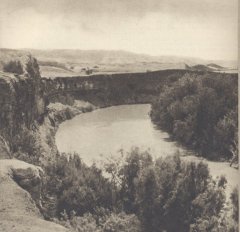
It may be surmised that even though Annas and company know him and know John is 'unlearned', that he is not a scribe, he has been known to them and has sat in on conversation in Jerusalem. John witnesses John the Baptist speaking to the priests, and if you read carefully you can see John is with the Jews, which is what John calls the Judean leadership, when they go out to hear John the Baptist
And this is the record of John, when the Jews sent priests and Levites from Jerusalem to ask him, “Who art thou?” (John 1:19)
It is John only who mentions all the discussions held by the Judean leadership. John may have been an eyewitness,
Then many of the Jews which came to Mary (sister of Lazarus), and had seen the things which Jesus did, believed on him. But some of them went their ways to the Pharisees, and told them what things Jesus had done.
Then gathered the chief priests and the Pharisees a council, and said, “What do we? for this man does many miracles. If we let him thus alone, all men will believe on him: and the Romans shall come and take away both our place and nation.”
And one of them, named Caiaphas, being the high priest that same year, said unto them, “Ye know nothing at all, Nor consider that it is expedient for us, that one man should die for the people, and that the whole nation perish not. And this spake he not of himself: but being high priest that year, he prophesied that Jesus should die for that nation;
And not for that nation only, but that also he should gather together in one the children of God that were scattered abroad. Then from that day forth they took counsel together for to put him to death.
Jesus therefore walked no more openly among the Jews; but went thence unto a country near to the wilderness, into a city called Ephraim, and there continued with his disciples. (John 11:45-54)
John has a high regard for the prophecy of the High Priest, and it seems by the aside John adds that after the event John understands the prophecy. It is clear that Jesus knew what was determined at that meeting, and it makes sense if John had been there (just as he later sat in on the trial of Jesus), and had told Jesus. John alone mentions Nicodemus a ruler of the Jews, whereas none of the other gospel accounts do. Nicodemus was a Pharisee and a learned Master teacher, or doctor of the Law (John 3:10). John knows him well enough to gather and write the account his witness.
3) The standard of learning in the years C.E.
The educated and 'uneducated'

But what was the standard of 'private people', of the general public of this time? What might the difference be between the merely educated and the nit-picking Torah scholars and their academic doctors? The modern world has a habit of thinking knowledge has progressed. But progress has been very uneven, and there is evidence of significant loss of knowledge. It was prophesied in Daniel,
But thou, O Daniel, shut up the words, and seal the book, even to the time of the end: many shall run to and fro, and knowledge shall be increased. (Daniel 12:4)
Daniel is speaking of only our time since mid 1800's, before that there had not been a huge growth in knowledge since the heights of knowledge that were achieved in the classical world. At the time of the going forth of the Gospel in the years Anno Domini the world was at the height of the power and stability of the Roman Empire, and even the meanest citizen might have been able to read and write 2 languages, and the leaders of high scholarship were renowned for an unmatched standard of excellence, many of them valued and quoted even today. It is to be noted that even while not known as a teacher Jesus was called to read at the Synagogue. It seems all men could read the scriptures, and in fact even today, turning twelve in Judaism means a boy is first called up to read, and they are regularly expected to read the scriptures in Hebrew from the bimah (platform) after that.
Even at 12 years old Jesus stunned the teachers (doctors of the Law) in Jerusalem with his knowledge – and these teachers might have included the great Hillel himself. Hillel the Elder (~110 BCE-10 AD), is deemed the greatest sage of the Second Temple period, and is still quoted. The Talmud, lists seven leaders of Hillel's school of thought including Gamaliel who we know from the scriptures. These were given the title Rabban/Rabbi (master/doctor), a title also given to the leader of the Sanhedrin. This was the era of great schools, and scholarship, as not only is the school of Hillel famous, so was that of Shammai (50BC–30AD) who was a scholar who was an important figure in Judaism's core work of rabbinic literature, the Mishnah, and still highly regarded. Even these men, or those led by them, valued the greatness of thought of Jesus, and could not answer it!
Now about the midst of the feast Jesus went up into the temple, and taught. And the Jews marvelled, saying, How knows this man letters (detailed study of the Torah/ Scriptures), having never learned? Jesus answered them, and said, “My doctrine is not mine, but his that sent me.” (John 7:14-16)
Jesus' teaching was far and beyond superior to the best the world has seen, and he learned the Scriptures through knowing them and knowing the thinking of his Father. But note Jesus' answer- the reason why his doctrine, his teaching, was beyond others is that Jesus spoke the word of Yahweh, not his own learned musings. Jesus wasn't a great one in the midst of idiots, he was a great one in the midst of the great minds.
Jesus knew he was greater than Solomon.
And when the people were gathered thick together, he began to say, This is an evil generation: they seek a sign; and there shall no sign be given it, but the sign of Jonas the prophet. For as Jonas was a sign unto the Ninevites, so shall also the Son of man be to this generation. The queen of the south shall rise up in the judgment with the men of this generation, and condemn them: for she came from the utmost parts of the earth to hear the wisdom of Solomon; and, behold, a greater than Solomon is here. (Luke 11:29-31)
He is not modest, he doesn't have to be. He speaks truth and fact. It is a fact we can know also. The greatest minds who have ever lived, at any time, have been given pause by Jesus' words and thoughts. And John learnt from him, stuck close by him and took notes, and more than that absorbed Jesus' knowledge. We are told this directly in the gospel records, After sending away the crowds Jesus goes into a house and teaches his disciples only, He calls them scribes
Jesus saith unto them, “Have you understood all these things?”
They say unto him, “Yea, Lord.”
Then said he unto them, “Therefore every scribe which is instructed unto the kingdom of heaven is like unto a man that is an householder, which brings forth out of his treasure things new and old.” (Matthew 13:51-52)
Learning in the Empire CE
Not only is this a great era in Jewish thought (a high point before the destruction that would come from 66-73AD), it was a great era in learning and a culture of writing of popular plays and poetry in the Greco-Roman Empire, which only comes with a well educated population. Some of these names are well known today
Varro (116-27BC) Nepos (110-24), Cicero (106-43BC), Caesar (100-44BC), Lucretius (94-52BC), Hirtius (90-43BC), Catullus (87-54BC), Sallust (86-35BC), Vergil (70-19BC), Gallus (66-26), Horace (65-8BC), Augustus (63BC- 14AD) Livy (59BC- AD17), Tibullus (55-19), Ovid (43 BC- AD17), Seneca (4 BC-65AD), Phaedrus (14-54 AD), Pliny the Elder (23AD-79AD), Petronius (27AD-66AD), Persius (34AD-62AD), Quintilian (35AD-100AD) Lucan (39-65) Martial (40-104), Statius (45-96) Juvenal(47-130) Tacitus (56AD-120AD) Pliny the Younger (61-111) Suetonius (75-150) Aurelius (121-180) Apuleius (124-170) Gellius (130-170)
Livy is often quoted as he wrote a history of Rome, but he was also known as a popular writer of treatises. Vergil, Horace and Ovid were studied as part if a classical education in England the 1800's. They are poets and writers. The apostle Paul, who is from a Roman city, knows and refers to writers such as these. At Mars' hill Paul said,
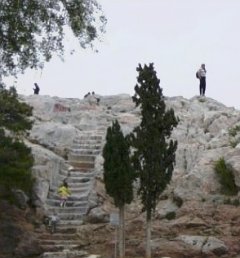
“Ye men of Athens, I perceive that in all things ye are too superstitious. ...; God that made of one blood all nations....That they should seek the Lord, if haply they might feel after him, and find him, though he be not far from every one of us: For in him we live, and move, and have our being; as certain also of your own poets have said, For we are also his offspring. (Acts 17:22-28)
In the world Jesus and John lived in there was considerable practical knowledge from Pythagoras' theorems to the value of 'pi'. Most proofs for modern geometry were known from the time of Euclid (300BC) and they may have known a reasonably accurate measurement of the circumference of the earth (Eratosthenes 275-194BC). The world already knew the theory of the atom as we can prove from Peter and Paul's writings, as they both use the Greek word 'stoicheion' translated correctly as 'elements', and Paul correctly refutes wrong Greek philosophical theory,
But now, after that ye have known God, or rather are known of God, how turn ye again to the weak and beggarly elements, whereunto ye desire again to be in bondage? (Galations 4:9)
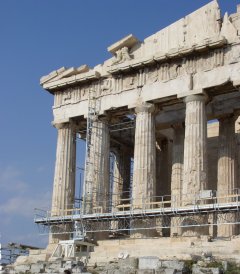
The single most influential book on architecture ever was already written by the Roman architect Vitruvius around the year 25BC. As Jesus was trained as a carpenter he might even have known of it. It was a collection of existing knowledge written in both Greek and Latin and in plentiful circulation, so that even by 800AD many copies were still in wide circulation. It reveals a not to be despised state of knowledge regarding city planning, surveying, building technology, solar building design, 3D drawing projection, heating, plumbing, the movement of the sun, mechanics, water powered mills, de-watering machines and even lead contamination (which the modern world had to learn again).
From the mid Second Century AD there is a decline in the numbers of general historians, scholars, poets and playwrights as the Roman Empire was in decline. Scholars now know that the common Greek used in the New Testament was used Empire wide, from one end of the known world to the other, in the same way English is used today. In addition the educated knew and used classical Greek, in the same way people know and use Shakespearean English.
Archaeologists have found Greek manuscripts of this first century era in Egypt, showing that all the empire spoke and wrote Greek. It is understood that Matthew (Levi) who was a tax collector could write ably both in Greek and Hebrew, and wrote his gospel, without translation, in both languages. Paul of Tarsus of course was proficient in Greek. It seems John (the unlearned and 'private' self-educated) could also write in Greek, and may have learned it as a child or teen. It is now well known that those in Galilee were more likely to know Greek, as they were more Hellenised. John by implication tells us, he knew enough to know Greek and Latin when he saw it,
And Pilate wrote a title, and put it on the cross. And the writing was, JESUS OF NAZARETH THE KING OF THE JEWS. This title then read many of the Jews: for the place where Jesus was crucified was nigh to the city: and it was written in Hebrew, and Greek, and Latin. (John 19:19-20)
John mentions in his gospel four times the translation of a word into Hebrew, and his is the only gospel that does so. In addition he often gives translations. Examples are,
When Pilate therefore heard that saying, he brought Jesus forth, and sat down in the judgment seat in a place that is called the Pavement, but in the Hebrew, Gabbatha. (John 19:13)
He first finds his own brother Simon, and said unto him, We have found the Messiah, which is, being interpreted, the Christ. (John 1:41)
And said unto him, Go, wash in the pool of Siloam, (which is by interpretation, Sent.) He went his way therefore, and washed, and came seeing. (John 9:7)
This shows John is aware of two names, both the Hebrew and the Greek, and when writing in Greek uses the Greek name. It reveals two things. Firstly that Jerusalem was bi-ligual, and secondly that John knew scholarly Hebrew, the language of Jewish learning.
4) The beauty of John's letters

Such is John's proficiency and simplicity in his use of Greek, that his letters are used as primers to teach Biblical Greek for beginners! It is just possible that the simplicity of the Greek may be due to it being John's second language, but, it is well known that simplicity of that order is actually a result of great thought and skill.
A comparison with Matthew, Mark and Luke's gospel records to that of John, shows John uses a level of language and structure that lifts his above the others.
A comparison of the writing of Paul shows something more interesting. Paul was the learned scholar brought up at the feet of Gamaliel, and formally trained in argument in the Law. He was precisely what Annas and the leaders of Jerusalem knew John was not. Paul, when he was converted, gave up the possibility of being a great leader amongst the Sanhedrin. Paul was liable to produce convoluted thought that covered deep insights into the law, bounding from one analogy to another. Paul is, quite simply, a brilliant scholar. Peter recognises this,
And account that the longsuffering of our Lord is salvation; even as our beloved brother Paul also according to the wisdom given unto him has written unto you; As also in all his epistles, speaking in them of these things; in which are some things hard to be understood, which they that are unlearned and unstable wrest, as they do also the other scriptures, unto their own destruction. (2Peter 3:15-16)
John by contrast uses simple powerful ideas in language any child may understand, to make profound though provoking comment. Paul was clever, and he had every advantage that learning could give him, but John was a genius.
Genius does not need to be taught, rather they find opportunity and learn. It is well known that Albert Einstein's IQ was not extra-ordinarily high, and Isaac Newton struggled at school. Both were self taught ('unlearned') and did their best work in a short period of time where they could focus on ideas they had been thinking on for years. Their best work came from time spent outside academia. For Newton time at home due to the plague and for Einstein while at the patent office.
In the record we have all the clues that show that John was a learner and sought intellect. John was a witness of John the Baptist's ministry. Though a Galilean fisherman, he must have had enough slack time to spend quite a bit of time by the Jordan down near Jerusalem nearly 100km away from his home, in an era where the transport was mostly by foot. In addition, John turns up to the Jordan in the company of Priests and Levites and the record shows he is known by sight by the high priest, Annas and listens in on deliberations of the chief priests and Pharisees (John 11:47). John shows in his record that he knows exactly what the Judean leadership is thinking. John knows the people of intellect. John listened to Jesus so that only through his gospel do we have Jesus' detailed arguments with the leaders of his day.
5) John, son of David and Aaron
(of the king and high priests)?

There is something that one may ponder, as there is the implication of John's connection to the Levitical tribe and to Aaron the high priestly family, the tribe of teachers of the Law. John's genius and likeness to our Lord may be related, as Jesus was also related to the Levitical tribe and the family of Aaron, through Mary. Now John the Baptist was Jesus' second cousin and John the Baptist was also of the priestly family with his father serving as priest and his mother a descendant of Aaron
There was in the days of Herod, the king of Judaea, a certain priest named Zacharias, of the course of Abia: and his wife was of the daughters of Aaron, and her name was Elisabeth. (Luke 1:5)
Elizabeth was not just of Levi, or of the priests but of the high priests. Through Elizabeth of the family of Aaron, John the Baptist is related to Jesus's mother.
The apostle John possibly has a close relationship to Jesus for three reasons. Firstly only John reports the wedding in Cana in Galilee which shows all of Jesus' family and, secondly, John's mother comes to Jesus to ask for special status for her sons and, thirdly John is given the care of Mary, Jesus' mother, not Jesus' brothers.
Now there stood by the cross of Jesus his mother, and his mother's sister, Mary the wife of Cleophas, and Mary Magdalene. When Jesus therefore saw his mother, and the disciple standing by, whom he loved, he saith unto his mother, Woman, behold thy son! Then saith he to the disciple, Behold thy mother! And from that hour that disciple took her unto his own home. (John 19:25-27)
This last especially implies a relationship. Another record says that John's mother was there next to Jesus' mother (called by Matthew the mother of James and Joses [cp Matt 13:55]).
Among which was Mary Magdalene, and Mary the mother of James and Joses, and the mother of Zebedee's children. (Matthew 27:56)
We are told clearly that Jesus had an aunt. It may be that of all the apostles, with John there was special kin of kin with like minds with Jesus,
Then Peter, turning about, sees the disciple whom Jesus loved following; which also leaned on his breast at supper, and said, Lord, which is he that betrays thee? Peter seeing him saith to Jesus, “Lord, and what shall this man do?”
Jesus saith unto him, “If I will that he tarry till I come, what is that to thee? follow thou me.”
(John 21:20-22)

We know that Mary was of the royal house of David, therefore her sister would have been also. Mary was given to Joseph, who was a carpenter, but who also belonged to the Royal dynasty and so in those families united two great royal lines. Mary's sister (Jesus' aunt), it seems, was given to Zebedee, who must have been a great man, though his trade was a fisherman, as she is always “the mother of Zebedee's children”. Zebedee was no poor fisherman, his wife was of the royal house and he could allow John to leave the business and make the journey to Jerusalem and to the wilderness.
Now as he walked by the sea of Galilee, he saw Simon and Andrew his brother casting a net into the sea: for they were fishers. And Jesus said unto them, Come ye after me, and I will make you to become fishers of men. And straightway they forsook their nets, and followed him. And when he had gone a little further thence, he saw James the son of Zebedee, and John his brother, who also were in the ship mending their nets. And straightway he called them: and they left their father Zebedee in the ship with the hired servants, and went after him. (Mark 1:16-20)
It is clear that Zebedee is not a poor man and can afford not just one servant, but a few servants. We can see John was not crucial to operations. It is clear Zebedee can support not only both his sons leaving the work for over three years, but his wife offering support to Jesus' ministry.
We know that if John's mother was sister to Jesus' mother that both were related to the family of Aaron from which came the High Priests. It is a long tradition that Judean royalty married into the high priest's family and vice versa (For example King Joash's sister was married to the high priest, and at one point priests and kings were so related they had the same name as at the time of Azariah). These are no ordinary people. These are the aristocracy and intelligentsia of a world that had been lost due to Herod's take over and Roman dominance. Think of them as ex-European Royalty in the age of democracy. They live as commoners, have jobs and may even be self-made wealthy. They have no political power and in dealings with people are as ordinary people, but they know who they are, and they marry accordingly. John's family was not poor, his education would have been as good as the best, and in addition, possibly due to family connections, he had exposed himself to the best of the learning of Jerusalem.
6) John's letters

Now we know that Jesus loved John as the 'son of rage(thunder)'. We hear the righteous thunder in his letters through his clear, black and white statements,
If we say that we have fellowship with him, and walk in darkness, we lie, and do not the truth: (1John 1:6)
John's habit of using “we” to describe the unity of Jesus and his apostles and how people are either of “us” or “not us”, is clear in such statements as the following,
If we say that we have not sinned, we make him a liar, and his word is not in us. (1John 1:10)
Now we suspect John has a right to be beside Jesus, by blood and intellect. We note,
And now, little children, abide in him; that, when he shall appear, we may have confidence, and not be ashamed before him at his coming. (1John 2:28) Behold, what manner of love the Father has bestowed upon us, that we should be called the sons of God: therefore the world knows us not, because it knew him not. Beloved, now are we the sons of God, and it does not yet appear what we shall be: but we know that, when he shall appear, we shall be like him; for we shall see him as he is. (1John 3:1-2)
Of all the apostles it was John who was given the privilege of penning the last letter of Jesus to us, the only letter written specifically to us today. In this letter we see again John associated with thunder,
And I saw when the Lamb opened one of the seals, and I heard, as it were the noise of thunder, one of the four living ones saying, “Come and see.” (Revelation 6:1, cp Revelation 14:2)
7) John's great issue – his letters & The Great Lie

At first glance John seems to be the Apostle of the doctrine of brotherly love. And Certainly John uses in his letters the word 'agapao' to love in a social sense 16 times and 'agapa' meaning affection or benevolence 19 times. Those who read the letters superficially with their own conceptions of what “love” means may miss what John's issues were.
If love is about sentimental affection and being nice to each other, John has a very disturbing message, if we read closely.
The first point to notice is that the book is not about love at all but is about the liar(s). A word search shows 'liar' appears 13 times in the whole scriptures, 7 times the word is used by John. The Greek word 'liar' is pseustos and means 'a falsifier'. The word 'lie' is used 24 times in the New Testament, of which 3 are in John's gospel and 3 in John's letters (accounting for fully one quarter of all references). John cares intensely about absolute truth.
The word 'truth' occurs 119 times in the New Testament, of which 27 occurrences are in John's gospel and 21 in John's letters (nearly one third of all occurrences). John's letters are about the importance of the truth.
The situation of increasing error is explained by Paul's letter to the Thessalonians. He makes no apologies and says there is a deceiver already at work in the Congregation.
For the mystery of iniquity does already work: only he who now lets will let, until he be taken out of the way. And then shall that wicked be revealed, whom the Lord shall consume with the spirit of his mouth, and shall destroy with the brightness of his coming: Even him, whose coming is .. with all power and signs and lying wonders, And with all deceivableness of unrighteousness in them that perish; because they received not the love of the truth, that they might be saved. And for this cause God shall send them strong delusion, that they should believe a lie: That they all might be damned who believed not the truth, but had pleasure in unrighteousness. (2Thessalonians 2:7-12)
This deceiver would believe a lie. Peter sharply rebukes the people of the Congregation for doctrinal error,
And shall receive the reward of unrighteousness, as they that count it pleasure to riot in the day time. Spots they are and blemishes, sporting themselves with their own deceivings while they feast with you; (2Peter 2:13)
But the most savage indictment of the congregation is that of Jude,
Beloved, when I gave all diligence to write unto you of the common salvation, it was needful for me to write unto you, and exhort you that ye should earnestly contend for the faith which was once delivered unto the saints. For there are certain men crept in unawares, who were before of old ordained to this condemnation, ungodly men, turning the grace of our God into lasciviousness, and denying the only Lord God, and our Lord Jesus Christ. (Jude 1:3-4)
But, beloved, remember the words which were spoken before by the apostles of our Lord Jesus Christ; How that they told you there should be deriders (empaiktēs, false teachers) in the last time, who should walk after their own ungodly lusts. (Jude 1:17-18)
What was going on? It seems there were a few issues. Paul early in ecclesiastical history deals with the doctrine of a literal resurrection in Corinthians (1 Cor. 15:17). Paul adds
For there must be also heresies among you, that they which are approved may be made manifest among you. (1Cor. 11:19)
Peter later targets one false doctrine that is related to that the idea of Jesus' coming
Knowing this first, that there shall come in the last days deriders (empaiktēs, false teachers), walking after their own lusts,
And saying, Where is the promise of his coming? for since the fathers fell asleep, all things continue as they were from the beginning of the creation. (2 Peter 3:1-4)

But the issue John names (and Jude alludes to) is far more serious, even more than the doctrine of a bodily resurrection and the second coming of Jesus. He called those who had the idea 'substitute christs' teaching a substitute idea, a lie, and it was to result in a strong division,
Little children, it is the last time: and as you have heard that antichrist shall come, even now are there many antichrists; whereby we know that it is the last time.
They went out from us, but they were not of us; for if they had been of us, they would no doubt have continued with us: but they went out, that they might be made manifest that they were not all of us. (1 John 2:18-19)
What was the idea these teachers had?
Hereby know you the Spirit of God: Every spirit that confesses that Jesus Christ is come in the flesh is of God:
And every spirit that confesses not that Jesus Christ is come in the flesh is not of God: and this is that spirit/mind of antichrist, whereof ye have heard that it should come; and even now already is it in the world. (1John 4:1-3)
It is very simple and must not be seen as more complex. Every true teacher must confess that Jesus Anointed is come in the flesh, (Genesis 9:15, Job 34:15, Isaiah 40:6 'all flesh is grass' 1 Peter 1:24).
John made a powerful point that there are two classes those 'sons of God' and those 'sons of the slanderer' who hold the doctrine of the lie, who like Cain hated their brother who had the truth, and killed them. But those with the truth could be known for never hating their brother.
If a man say, I love God, and hates his brother, he is a liar: for he that loves not his brother whom he has seen, how can he love God whom he has not seen? (1John 4:20)
This was seen in church history. Christianity from the third and fourth century had a terrible history of bloodshed to rival paganism.
John is of such genius that he strips complexity to simplicity. He gets to the heart of error. John is showing that this issue of love is one way to see the true believer from the false-
but love is not tolerance, it is about revealing and discerning that false doctrine!
Those that have their own doctrine and not Yahweh's are defensive of their doctrine and will persecute those who disagree with them. The truth, as John points out, stands for itself – we do not have to fight for the acceptance of it. It is not negotiable, it is not a thing of opinion that can be argued about. It is a thing that exists of itself in the text to be sincerely enquired into by those that love Yahweh. Those that do not love Yahweh will never see the truth. This is John's point.
8) John himself
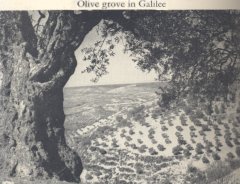
There is no physical description of John. He was young at the time of the ministry, but was old when he penned Revelation. He will be ageless when he is in the Regeneration of the kingdom that he (and his mother) so looked forward to, where he may, or may not, be sitting to the right or left hand of Jesus. It is likely that John who sought to be close, and believed, while Jesus' own brothers James, Joses, Simon and Judah doubted him, will be given a position close to his 'Master'. It is at Jesus' last Passover and the prayer that all may be one, that John speaks of himself as the disciple Jesus loved. John exemplifies most Jesus' prayer.
Neither pray I for these alone, but for them also which shall believe on me through their word; That they all may be one; as thou, Father, art in me, and I in thee, that they also may be one in us: that the world may believe that thou hast sent me. (John 17:20-21).
John, though possibly a relative of Jesus, heeded Jesus' advice that the greatest must be a servant of all, and sees himself as Jesus' servant (Revelation 1:1),
If I then, your Lord and Master, have washed your feet; ye also ought to wash one another's feet. For I have given you an example, that ye should do as I have done to you. (John 13:14-15)
We have the impression that John watched, listened and evaluated. His gospel notes who believed and who did not. His is a record of what he saw and why he believed, (and also why others should believe, but would not believe).
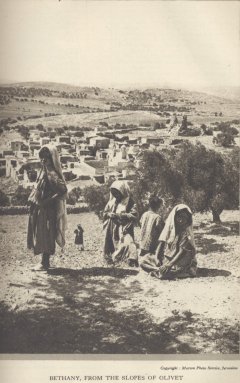
This beginning of miracles did Jesus in Cana of Galilee, and manifested forth his glory; and his disciples believed on him. (John 2:11)
Then answered the Jews and said unto him, What sign showest thou unto us, seeing that thou doest these things?
Jesus answered and said unto them, “Destroy this temple, and in three days I will raise it up.”
Then said the Jews, Forty and six years was this temple in building, and wilt thou rear it up in three days? But he spake of the temple of his body.
When therefore he was risen from the dead, his disciples remembered that he had said this unto them; and they believed the scripture, and the word which Jesus had said. (John 2:18-22)
Then went in also that other disciple, which came first to the sepulchre, and he saw, and believed. (John 20:8)
John listened to all sides and weighed the evidence then with knife-like logic and intellect, discerned truth and error. And he believed the word of truth.
When we meet John, we should expect he will be the same, and that he would expect the same from us. A quiet man, who listens, but when he speaks it is like sudden thunder giving judgement and dividing truth from error. A man who, more than another, sought to be at one with his master, and sought that all be one in Messiah. There were James' and Peter, who were leaders of men, but John was a leader most like his Lord (Master/Rabbi), he was a leader who was first a follower and servant.
That which we have seen and heard declare we unto you, that ye also may have fellowship with us: and truly our fellowship is with the Father, and with his Son Jesus Christ. (1John 1:3)
9) John's summary: The word made flesh

One last point. Most could quote how Jesus fulfilled this or that scripture. Peter wrote the following,
Of which salvation the prophets have enquired and searched diligently, who prophesied of the grace that should come unto you: Searching what, or what manner of time the spirit of Christ which was in them did signify, when it testified beforehand the sufferings of Christ, and the glory that should follow. Unto whom it was revealed, that not unto themselves, but unto us they did minister the things, which are now reported unto you by them that have preached the gospel unto you with the holy spirit sent down from heaven; which things the angels desire to look into. (1Peter 1:10-12)
John's intellect was such that he could embrace the grand idea that Jesus fulfilled all the scripture (Old Testament). He could see in the events he witnessed the long expected fulfilment of the expressed will and the word of God. John summarises the same sentiments as Peter felt, but far more succinctly, and more powerfully,
But as many as received him, to them gave he power to become the sons of God, even to them that believe on his name: Which were born, not of blood, nor of the will of the flesh, nor of the will of man, but of God. And the Word was made flesh, and dwelt among us, (and we beheld his glory, the glory as of the only begotten of the Father,) full of grace and truth. (John 1:12-14)
Only those who understand the declaration of the purpose of the God of Israel in his Name which is recorded in the Scripture in Deuteronomy 6:4 can understand what it means when He declared He would be “one” or united. John understood.
That which was from the beginning, which we have heard, which we have seen with our eyes, which we have looked upon, and our hands have handled, of the Word of life; (1John 1:1)
The 'word of life' is the Scriptures, which if a person 'eat of' they will live. This was written in circulation before Revelation. It seems as if a dialogue occurs. Jesus' replies to John, who in his grasp of all the word of God had called Jesus “the word made flesh.”
And I saw heaven opened, and behold a white horse; and he that sat upon him was called Faithful and True, and in righteousness he doth judge and make war. His eyes were as a flame of fire, and on his head were many crowns; and he had a name written, that no man knew, but he himself. And he was clothed with a vesture dipped in blood: and his name is called The Word of God. (Revelation 19:11-13)
We know Jesus called James and John 'sons of thunder', but who in effect called Jesus 'the word of God'? It was John!

For his breadth of understanding John is shown more, he hears the seven thunders which is not given to us.
And when the seven thunders had uttered their voices, I was about to write: and I heard a voice from heaven saying unto me, Seal up those things which the seven thunders uttered, and write them not. And the angel which I saw stand upon the sea and upon the earth lifted up his hand to heaven, And sware by him that lives for ever and ever, who created heaven, and the things that therein are, and the earth, and the things that therein are, and the sea, and the things which are therein, that there should be time no longer: (Revelation 10:4-6)
How right that John, one of the 'sons of thunder' should hear the seven thunders. John who, believing, comprehended that the scripture, the word of God, was made flesh was shown the end of time to the fulfilment and entire completion of all the word of God.

And he that sat upon the throne said, Behold, I make all things new. And he said unto me (John), Write: for these words are true and faithful. And he said unto me, It is done. I am Alpha and Omega, the beginning and the end. I will give unto him that is athirst of the fountain of the water of life freely. (Revelations 21:5-6)
If you liked this you might like David and Daniel:Beloved of God
There are many misconceptions of what Anti-Christ means due to mis-information, and sensationalism. It is not hard to confirm what the Bible actually says.

 Show All
Show All

